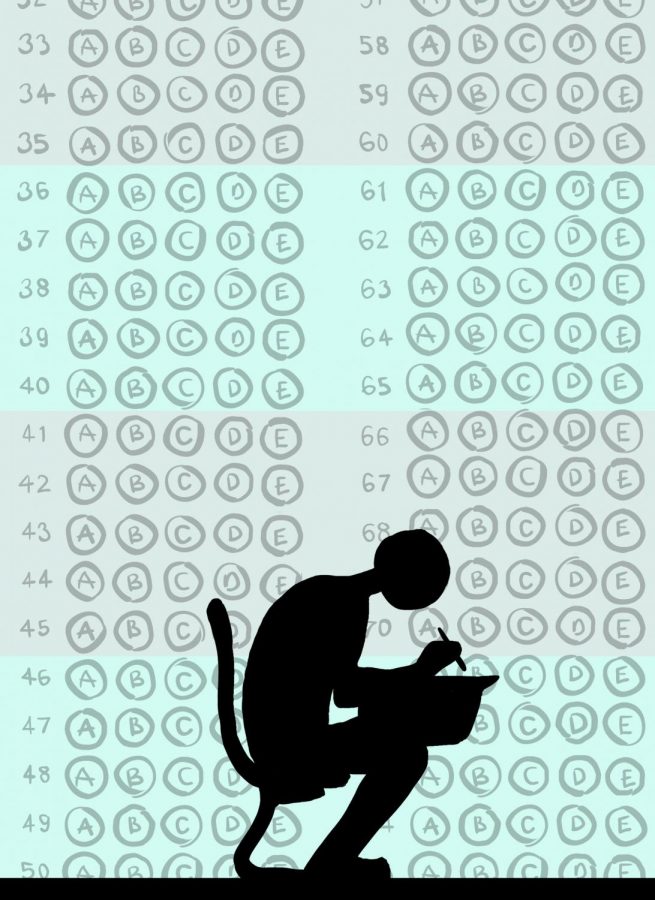The Glorification of Standardized Tests
OVERWHELMED BY THE BUBBLES: Standardized tests are more important than ever to colleges and are becoming a socioeconomic evaluation of students. Should they be so important? What should colleges really be looking at?
October 2, 2018
On at least one Saturday morning in all high school students’ careers, they will walk into a random location and sit down for five hours, taking a test that could ultimately decide the rest of their lives. The pressure, the expectation, the fear; how can students perform at their best when they know everything is on the line at that very moment?
As soon as they start high school, or even before, teenagers are pressured by parents, teachers and older siblings to get practice books, start studying online, and even go to a tutor, anything to get the upper hand when their test day comes around. For those who do not know, “the test” is referring to the ACT and SAT, the two standardized tests which colleges prefer when it comes to judging a how a student will do in college and often interpreted as one’s intelligence. Mandatory to just about every school’s application, a student’s score number is perhaps the most important thing that a college cares about in their application.
In 2009, College Confidential stated that “at competitive colleges, admissions officers blatantly admit that the SAT now carries more weight as an admission criterion compared to fifteen years ago,” and there isn’t much to believe its importance has diminished in the last decade.
If you still doubt the importance of these tests, College Confidential also reported that “prior to 1990, scholarship money was awarded only to athletic recruits and to students with high financial need. Today, almost every competitive four-year college awards scholarships to entice academic talent, and their assessment of ‘talent’ is the SAT / ACT score.” There is no way to understate its importance.
Should a five hour test triumph over a body of work that a student has built throughout their four years of high school? Because it only judges a students’ math, reading and writing abilities, there is much that this test cannot discover about multi-talented kids. Grades and classes may be a far more accurate representation of a student to colleges.
Of the eight people I interviewed, five agreed that students should be able to take either test as many times as they want. Senior Lauren Reising believed that anyone “could be having a bad day,” and one rough day “shouldn’t determine your future.” With so much on the line, just like any test at a school, it’s unreasonable to expect someone to do their absolute best on their one and only attempt. But unlike school tests, there are no test corrections to bump the score up again, or an entire year left to get the class grade back up.
Reversely, there were students who thought the number of attempts should be limited. Sophomore Emma Bi believes it is “slightly unfair because colleges don’t know how many times you’ve taken [the tests].” Another Sophomore, Eli Lazar, thought somewhere in between, believing that students should be limited to somewhere around “two attempts per test.” There was a general consensus between these students that accuracy through one test is more important than getting every student’s best score.
Because most agreed that taking the test more than once is a good idea, it is fair to assume that students think colleges should see students perform at their best and be able to show themselves at their academic peak. But now, it must be considered why some students are able to excel on these tests, while others are not.
Freshman Ben Bonnofsky believes the benefit of the SAT and ACT is that they “show in one period of time everyone at the same level.” Although on the surface it may appear that everyone is on the same playing field, the preparation that goes into the test can have extreme variance from student to student.
According to the New York Times, some families have spent “over $20,000 on SAT prep,” including tutors that charge “over $600 an hour.” You couldn’t possibly bribe a teacher $20,000 to raise a grade. With the right resources, any kid could get a SAT or ACT score that far exceeds their academic level.
Among every student I interviewed, there was a unanimous agreement that students should be provided with some form of free resources to study for these tests. Junior Amilia Esterhuizen thought that “given that the test is required, everyone should have access to free tutoring.” Even though this would give motivated students the opportunity to have extra practice and one on one tutoring time, these short sessions would pale in comparison to the intensive and personalized practice that money can buy the most fortunate and wealthy students.
One might be wondering what should be valued over the SAT and ACT. There is far more that can be discovered about a student on their transcript than a number out of 36 or 1600. Something like an AP/IB class is so ideal for students because, according to Mic, they show one’s “ability to master a subject [and] are more representative of the material you’ll cover in college.”
A transcript can show what a student is interested and excels in. A student whose strengths are in science and history would never be able to show off their talent on a math and reading SAT. The test score is only a brief snapshot into what a student is all about.
Four hours versus four years: what gives the best representation of a student? Yes, standardized tests can represent a student’s dedication to studying for one specific thing, but beyond that, how much does it really tell? Do colleges really care about one’s personality or interests? Let’s say the personal essay were the biggest decider in the college application process. Would the math wizards and bookworms find that fair?



